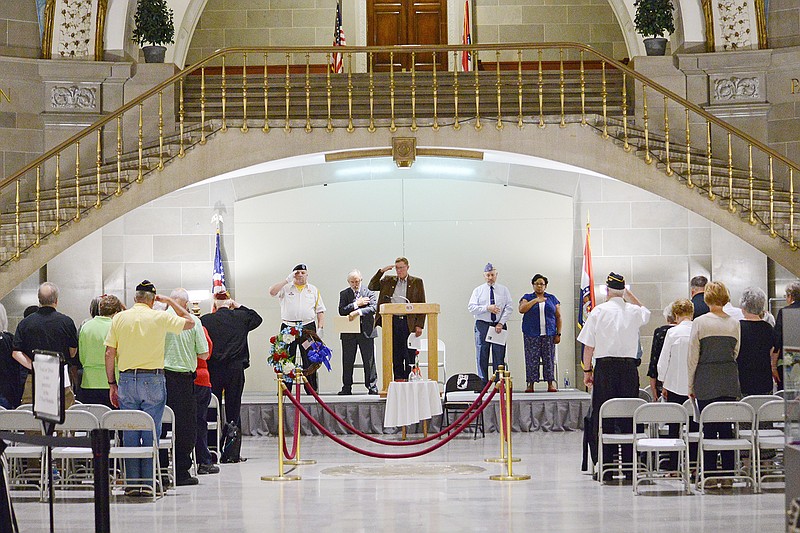The Jefferson City Veterans Council hosted a ceremony Friday evening in the Capitol as part of National POW/MIA Recognition Day.
The event is held to allow Americans to pause and reflect on the sacrifices and service of those who were prisoners of war and those who are considered missing in action, as well as their families.
Keynote speaker Gary Kremer, the executive director of the State Historical Society of Missouri, began his remarks with discussion about the recent death of U.S. Sen. John McCain.
"Sen. McCain was one of the most important military heroes of my generation," Kremer said.
While on a bombing mission during Operation Rolling Thunder over Hanoi in the Vietnam War, McCain was shot down, seriously injured and captured by the North Vietnamese.
Kremer said McCain would joke that he "intercepted a missile" while on the mission.
For nearly 5 years he was a prisoner of war and held in the prison camp that came to be known as the Hanoi Hilton.
He experienced frequent episodes of torture and refused to be released out of sequence when his captors learned he was the son of a U.S. Navy admiral. The injuries he suffered as a prisoner of war left him with lifelong physical disabilities.
"Sen. McCain was, I suppose, the embodiment of the kind of American we most admire - a self-effacing, self-sacrificing servant to the common good," Kremer said. "He was a self-described rebel.
"He struck me as the kind of guy you knew you could always count on."
Many who eulogized McCain expressed concerns they would never see someone like him again, Kremer said.
"I hope they are wrong.
"I grew up in a time when sacrifices made by military men and their families were deeply appreciated," Kremer said.
Kremer told the story of how his mother married her sweetheart during World War II, while he was home on leave. The couple had a weekend honeymoon and he was sent off to fight in the Philippines. She never saw him again.
Kremer's sister was born nine months later. On the eve of their one-year anniversary, the B-24 bomber Kremer's sister's father served as a tail-gunner in crashed shortly after a takeoff.
"I can only imagine how devastated my mom was," Kremer said. "She was a 22-year-old widow with a 3-month-old baby."
Kremer said he didn't think she ever fully recovered. She married Kremer's father after the war - a friend of her first husband.
At the State Historical Society of Missouri, staff are trying to preserve the stories of former prisoners of war while they still can. They have interviewed more than 100 former prisoners of war.
It's difficult.
Former prisoners don't like to discuss what happened to them, Kremer said.
They interviewed Joseph Bernstein, who was a Merchant Marine during World War II. He had joined the Merchant Marines shortly after graduating from high school, while only 16.
In June 1942, Germans sank his boat about 500 miles off the coast of Brazil.
He spent three years in a Japanese prisoner of war camp.
Bernstein said he'd never eat turnips again. If they ever got food in the camp, it was turnips. He had a tooth pulled without anesthetic. Because of malnutrition, Bernstein came down with dengue fever, dysentery and beriberi.
Bernstein would explain the reason he didn't like to tell his story is that anyone who didn't experience it wasn't about to understand it.
Kremer said Bernstein would tell interviewers: "The reason for (not telling my story) is the fact that - what's the sense of telling you something you don't know anything about anyway?"
He said Bernstein believed the average person has "no conception of how one human being could do that to another."
As part of Friday's remembrance, the Veterans of Foreign Wars Basinger/Sone Memorial Post 1003 performed a tribute to POW/MIAs.
Every veteran's organization has in its home or club room a Missing in Action Memorial Table, U.S. Navy veteran Thomas Ward said.
The table "serves as a reminder that those who suffered most will never be forgotten," Ward told about 75 people gathered for the remembrance.
He and other members of the post set a memorial table during the ceremony.
A small, poorly made table symbolizes the conditions prisoners face, he said as a member of the post brought forward a table.
A white tablecloth shows purity of service members' intentions, he said as another member of the post brought a cloth forward.
They continued, bringing a setting for one, for the "one against many who wish to do harm to America."
A vase tied with a red ribbon signifies blood shed for the country.
A rose reminds people of the missing life.
A slice of lemon symbolizes bitter fate.
A pinch of salt - the tears shed by the missing and their family.
The Bible, for the strength gained through faith.
A glass, inverted to symbolize their inability to be with us today.
And the empty chair - they are missing.

